高考英文重点专题复习情态动词与虚拟语气
- 格式:ppt
- 大小:905.00 KB
- 文档页数:63
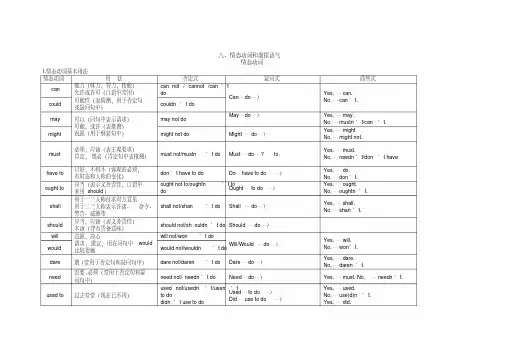
八、情态动词和虚拟语气情态动词I.情态动词基本用法情态动词用法否定式疑问式简答式can 能力(体力,智力,技能)允许或许可(口语中常用)可能性(表猜测,用于否定句或疑问句中)can not / cannot /can’tdoCan…do…?Yes,…can.No,…can’t.could couldn’t domay 可以(问句中表示请求)可能,或许(表推测)祝愿(用于倒装句中)may not doMay…do…?Yes,…may.No,…mustn’t/can’t.might might not do Might…do…?Yes,…might No,…might not.must 必须,应该(表主观要求)肯定,想必(肯定句中表推测)must not/mustn’t do Must…do…? to.Yes,…must.No,…needn’t/don’t havehave to 只好,不得不(客观的必须,有时态和人称的变化)don’t have to do Do…have to do…?Yes,…do.No,…don’t.ought to 应当(表示义务责任,口语中多用should)ought not to/oughtn’t todoOught…to do…?Yes,…ought.No,…oughtn’t.shall 用于一三人称征求对方意见用于二三人称表示许诺、命令、警告、威胁等shall not/shan’t do Shall…do…?Yes,…shall.No,…shan’t.should 应当,应该(表义务责任)本该(含有责备意味)should not/sh ouldn’t do Should…do…?will 意愿,决心请求,建议,用在问句中would比较委婉will not/won’t doWill/Would…do…?Yes,…will.No,…won’t.would would not/wouldn’t dodare 敢(常用于否定句和疑问句中)dare not/daren’t do Dare…do…?Yes,…dare. No,…daren’t.need 需要,必须(常用于否定句和疑问句中)need not/needn’t do Need…do…?Yes,…must. No,…needn’t.used to 过去常常(现在已不再)used not/usedn’t/usen’tto dodidn’t use to doUsed…to do…?Did…use to do…?Yes,…used.No,…use(d)n’t.Yes,…did.No,…didn’t. II.情态动词的重点知识表示“能力、许可”的can和may 表示能力的情态动词用can/couldA computer_____think for itself; it must be told what to do.A.can’tB.must n’tC.may notD.might not表示许可时用may/might ,can/could 都可以,但在问句中用could…?或might…?以使口气委婉客气,其回答一定要用can或may,以使回答口气明确(must表示一定,必须,mustn’t表示禁止,不许可)。
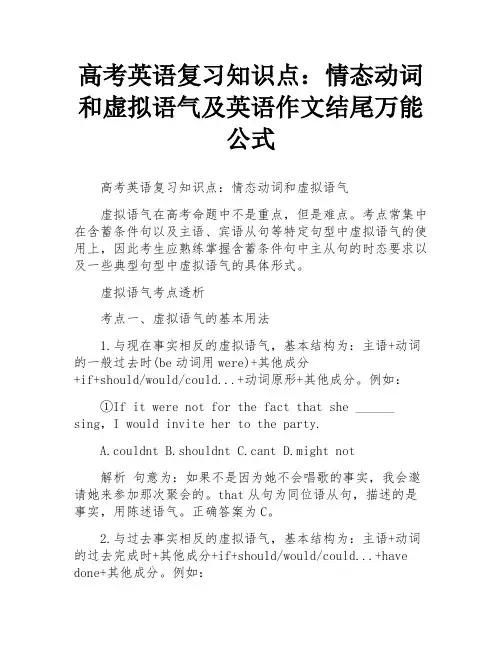
高考英语复习知识点:情态动词和虚拟语气及英语作文结尾万能公式高考英语复习知识点:情态动词和虚拟语气虚拟语气在高考命题中不是重点,但是难点。
考点常集中在含蓄条件句以及主语、宾语从句等特定句型中虚拟语气的使用上,因此考生应熟练掌握含蓄条件句中主从句的时态要求以及一些典型句型中虚拟语气的具体形式。
虚拟语气考点透析考点一、虚拟语气的基本用法1.与现在事实相反的虚拟语气,基本结构为:主语+动词的一般过去时(be动词用were)+其他成分+if+should/would/could...+动词原形+其他成分。
例如:①If it were not for the fact that she ______ sing,I would invite her to the party.A.couldntB.shouldntC.cantD.might not解析句意为:如果不是因为她不会唱歌的事实,我会邀请她来参加那次聚会的。
that从句为同位语从句,描述的是事实,用陈述语气。
正确答案为C。
2.与过去事实相反的虚拟语气,基本结构为:主语+动词的过去完成时+其他成分+if+should/would/could...+have done+其他成分。
例如:If the weather had been better,we could have had a picnic.But it ______ all day.A.rainedB.rainsC.has rainedD.is raining解析句意为:如果天气好的话,我们是能够去野餐的,但是下了一天的雨。
句子前半部分陈述的是与过去事实相反的事情,所以用了虚拟语气。
下了一天的雨是事实,所以用陈述语气。
因为是发生在过去的事实,所以正确答案为A。
3.与将来事实相反的虚拟语气,基本结构为:主语+动词的一般过去时/should do/were to do+其他成分+if+should/would/could...+动词原形+其他成分。
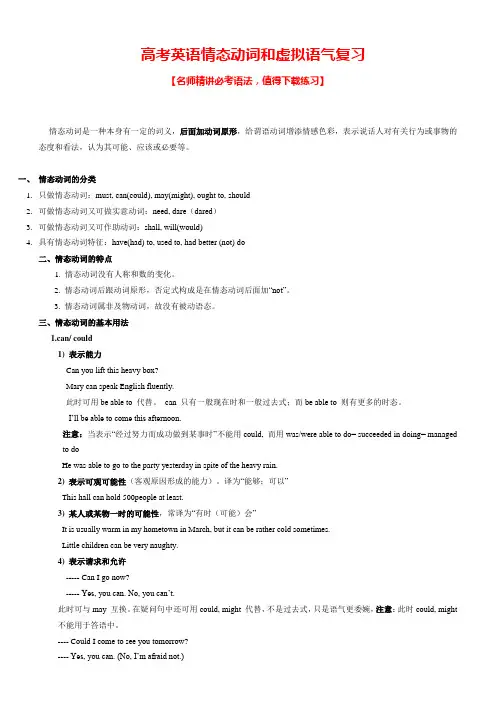
高考英语情态动词和虚拟语气复习【名师精讲必考语法,值得下载练习】情态动词是一种本身有一定的词义,后面加动词原形,给谓语动词增添情感色彩,表示说话人对有关行为或事物的态度和看法,认为其可能、应该或必要等。
一、情态动词的分类1.只做情态动词:must, can(could), may(might), ought to, should2.可做情态动词又可做实意动词:need, dare(dared)3.可做情态动词又可作助动词:shall, will(would)4.具有情态动词特征:have(had) to, used to, had better (not) do二、情态动词的特点1.情态动词没有人称和数的变化。
2. 情态动词后跟动词原形,否定式构成是在情态动词后面加“not”。
3. 情态动词属非及物动词,故没有被动语态。
三、情态动词的基本用法1.can/ could1) 表示能力Can you lift this heavy box?Mary can speak English fluently.此时可用be able to 代替。
can 只有一般现在时和一般过去式;而be able to 则有更多的时态。
I’ll be able to come this afternoon.注意:当表示“经过努力而成功做到某事时”不能用could, 而用was/were able to do= succeeded in doing= managedto doHe was able to go to the party yesterday in spite of the heavy rain.2) 表示可观可能性(客观原因形成的能力)。
译为“能够;可以”This hall can hold 500people at least.3) 某人或某物一时的可能性,常译为“有时(可能)会”It is usually warm in my hometown in March, but it can be rather cold sometimes.Little children can be very naughty.4) 表示请求和允许----- Can I go now?----- Yes, you can. No, you can’t.此时可与may 互换。
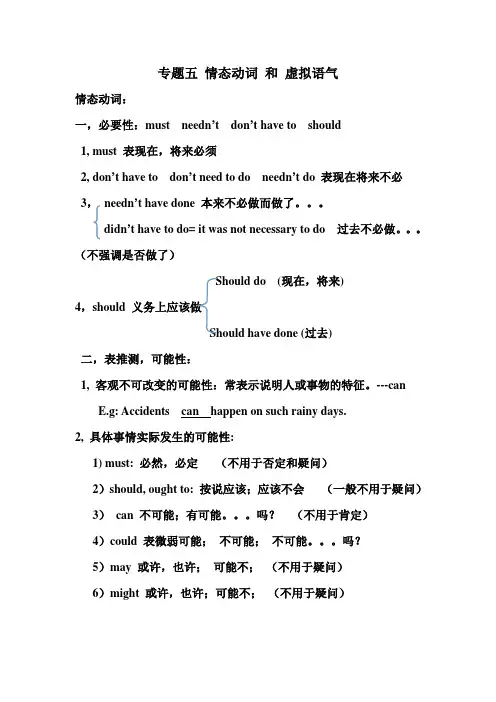
专题五情态动词和虚拟语气情态动词:一,必要性:must needn’t don’t have to should1, must 表现在,将来必须2, don’t have to don’t need to do needn’t do 表现在将来不必3,needn’t have done 本来不必做而做了。
didn’t have to do= it was not necessary to do 过去不必做。
(不强调是否做了)Should do (现在,将来)4,should 义务上应该做Should have done (过去)二,表推测,可能性:1, 客观不可改变的可能性:常表示说明人或事物的特征。
---canE.g: Accidents can happen on such rainy days.2, 具体事情实际发生的可能性:1) must: 必然,必定(不用于否定和疑问)2)should, ought to: 按说应该;应该不会(一般不用于疑问)3)can 不可能;有可能。
吗?(不用于肯定)4)could 表微弱可能;不可能;不可能。
吗?5)may 或许,也许;可能不;(不用于疑问)6)might 或许,也许;可能不;(不用于疑问)Can 表推测时,用于否定,疑问,表示一种疑惑,惊讶或不相信语气。
This can’t / couldn’t be done by him. (不相信)This may not be done by him. (不确定)Could,might 并不与过去时间有关,表示语气比can, may 语气弱。
Should 表推测时,表示合乎理想的情况或结果。
We should arrive before dark.三,表能力:Can / am, is, are, able to do 表现在的能力Will be able to do 表将来能力Could/ was, were able to do 表过去能够Could have done 表过去有能力但未做四,表请求,允许:1,当询问,请求的对象为决策者时:Shall i/we ...?May i /we ...?Will /Would you ...?2, could/ might/would/should...? 表委婉气3,shall 与第二,第三人称连用用于陈述句,表示说话者的命令,威胁,警告。
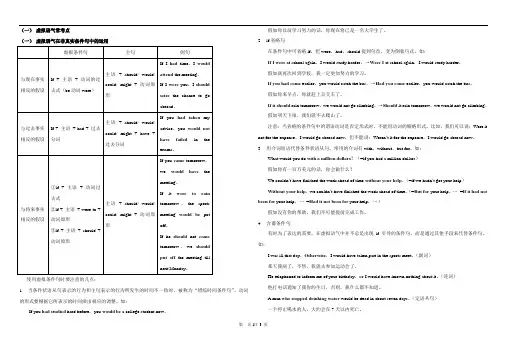
(一)虚拟语气常考点(一)虚拟语气在非真实条件句中的运用使用虚拟条件句时要注意的几点:1.当条件状语从句表示的行为和主句表示的行为所发生的时间不一致时,被称为“错综时间条件句”,动词的形式要根据它所表示的时间做出相应的调整。
如:If you had studied hard before,you would be a college student now。
假如你以前学习努力的话,你现在将已是一名大学生了。
2.if省略句在条件句中可省略if,把were,had,should提到句首,变为倒装句式。
如:If I were at school again,I would study harder。
→Were I at school again,I would study harder。
假如我再次回到学校,我一定更加努力的学习。
If you had come earlier,you would catch the bus。
→Had you come earlier,you would catch the bus。
假如你来早点,你就赶上公交车了。
If it should rain tomorrow,we would not go climbing。
→Should it rain tomorrow,we would not go climbing。
假如明天下雨,我们就不去爬山了。
注意:当省略的条件句中的谓语动词是否定形式时,不能用动词的缩略形式。
比如,我们可以说:Were it not for the expense,I would go abroad now。
但不能说:Weren’t it for the expense,I would go abroad now。
3.用介词短语代替条件状语从句。
常用的介词有with,without,but for。
如:What would you do with a million dollars?(=if you had a million dollars)假如你有一百万美元的话,你会做什么?We couldn’t have finished the work ahead of time without your help。
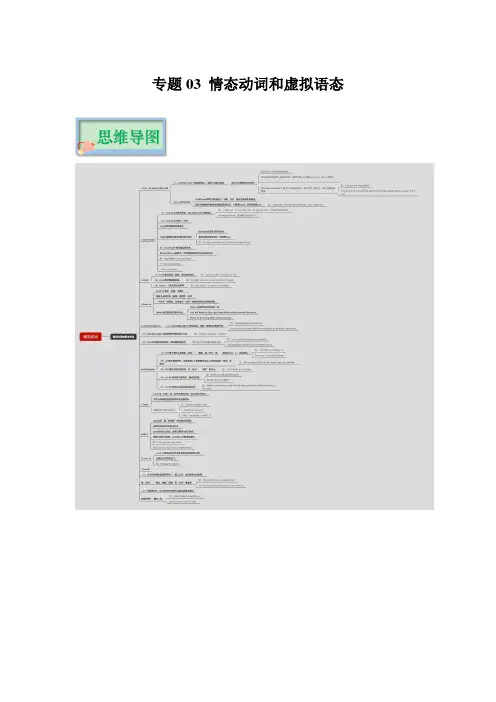
专题03 情态动词和虚拟语态情态动词★ 情态动词:can, could, may, might, must, ought to, shall, will, would, need ,dare1. 表示推测的情态动词1.1基本原则:1.1.2 对现在或将来情况推测,用情态动词+do / be / be doing…对过去的推测,用情态动词+have done / been…1.1.3表示肯定推测的情态动词,按可能性由大到小依次为:must> should / oughtto>may>might>could1.1.4否定推测,按语气由强到弱依次为:can’t / couldn’t(根本不可能)>may not> mightnot/could not(可能不)。
1.2 具体用法:1.2.1 must be表示推测,意为“一定是……” 只用于肯定句中must have done意为“一定做过某事或某事肯定发生了” 并且有前文铺垫e.g. Listen! There must be some children in the room.The road is wet. It must have rained last night.1.2.2 should (not) / ought (not) to在中表示根据常规或常识推测,表示“某事应该或不应该发生”e.g. It is nearly 7 o’clock. Jack should be here at any moment.You shouldn’t be texting in the class now. We are having a lesson.(should not 含有责备之意)1.2.3 can, could表达推测时,一般用于疑问句和否定句中;can用于肯定句中表示一种理论上的可能性,意为“有时候会…”,并不牵涉是否真的会发生;could用于肯定句中,语气比may/ might更弱。
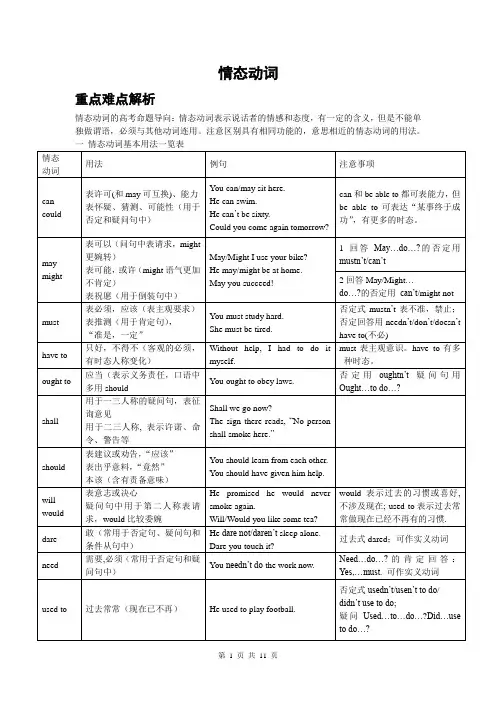
情态动词重点难点解析情态动词的高考命题导向:情态动词表示说话者的情感和态度,有一定的含义,但是不能单独做谓语,必须与其他动词连用。
注意区别具有相同功能的,意思相近的情态动词的用法。
二“情态动词+进行式”和“情态动词+完成式”用法一览表填入情态动词的恰当形式或根据括号所提供的词填入情态动词恰当的结构。
1. I should have been there, but I ____________ find the time.2. Helen _______ go on the trip with us, but she isn’t quite sure yet.3. Tom, you ___________ not leave all your clothes on the floor like this!4. You can’t imagine that a well behaved gentleman _____________ be so rude to a lady.5. It has been announced that candidates_____________ remain in their seats until all thepapers have been collected.6. ---Lucy doesn’t mind lending you her dictionary.---She ____________. I’ve already borrowed one.7. John, look at the time. _______________ you play the piano at such a late hour?8. ---__________ this book be yours?---No, it ____________ not be mine. It ___________ be his.9.As a girl, she ____________ get up at six every day.10.__________ he to clean the classroom after school?11.You ____________ be tired after the long trip, aren’t you?12.---What’s the name?---Khulaifi. __________ I spell that for you?13.You _____________________ (see) the film, haven’t you?14.You _____________________ (talk) on the phone at that time, for I couldn’t get through.15.They _____________________ (miss) the plane, or perhaps they have been prevented fromcoming for some reason.16.______________ you pass the college entrance examinations!17.He had known the matter before you told him, so you _________________ (not tell) it to him.虚拟语气重点难点解析虚拟语气的高考命题导向:虚拟语气表示说话人的愿望、假设、猜测或建议,而不是表示客观存在的事实。

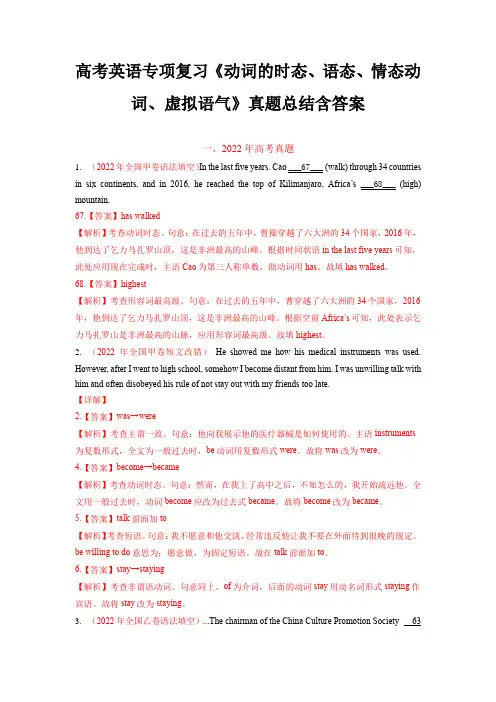
高考英语专项复习《动词的时态、语态、情态动词、虚拟语气》真题总结含答案一、2022年高考真题1.(2022年全国甲卷语法填空)In the last five years. Cao ___67___ (walk) through 34 countries in six continents, and in 2016, he reached the top of Kilimanjaro, Africa’s ___68___(high) mountain.67.【答案】has walked【解析】考查动词时态。
句意:在过去的五年中,曹操穿越了六大洲的34个国家,2016年,他到达了乞力马扎罗山顶,这是非洲最高的山峰。
根据时间状语in the last five years可知,此处应用现在完成时,主语Cao为第三人称单数,助动词用has。
故填has walked。
68.【答案】highest【解析】考查形容词最高级。
句意:在过去的五年中,曹穿越了六大洲的34个国家,2016年,他到达了乞力马扎罗山顶,这是非洲最高的山峰。
根据空前Africa’s可知,此处表示乞力马扎罗山是非洲最高的山脉,应用形容词最高级。
故填highest。
2.(2022年全国甲卷短文改错)He showed me how his medical instruments was used. However, after I went to high school, somehow I become distant from him. I was unwilling talk with him and often disobeyed his rule of not stay out with my friends too late.【详解】2.【答案】was→were【解析】考查主谓一致。
句意:他向我展示他的医疗器械是如何使用的。
主语instruments 为复数形式,全文为一般过去时,be动词用复数形式were。
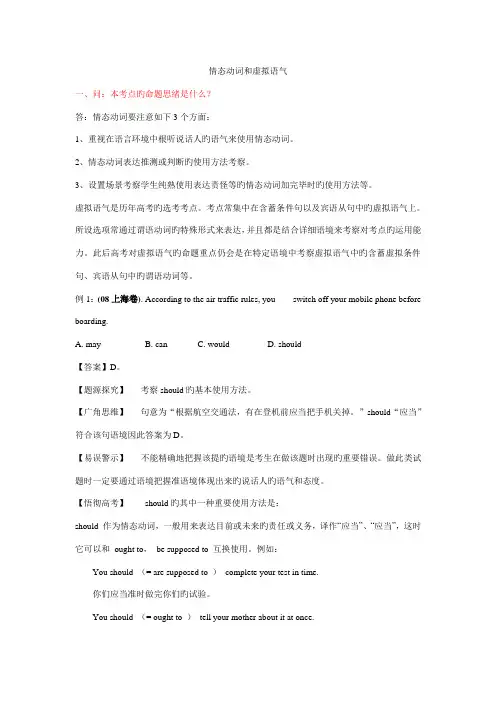
情态动词和虚拟语气一、问:本考点旳命题思绪是什么?答:情态动词要注意如下3个方面:1、重视在语言环境中根听说话人旳语气来使用情态动词。
2、情态动词表达推测或判断旳使用方法考察。
3、设置场景考察学生纯熟使用表达责怪等旳情态动词加完毕时旳使用方法等。
虚拟语气是历年高考旳选考考点。
考点常集中在含蓄条件句以及宾语从句中旳虚拟语气上。
所设选项常通过谓语动词旳特殊形式来表达,并且都是结合详细语境来考察对考点旳运用能力。
此后高考对虚拟语气旳命题重点仍会是在特定语境中考察虚拟语气中旳含蓄虚拟条件句、宾语从句中旳谓语动词等。
例1:(08上海卷). According to the air traffic rules, you ___ switch off your mobile phone before boarding.A. mayB. canC. wouldD. should【答案】D。
【题源探究】考察should旳基本使用方法。
【广角思维】句意为“根据航空交通法,有在登机前应当把手机关掉。
”should“应当”符合该句语境因此答案为D。
【易误警示】不能精确地把握该提旳语境是考生在做该题时出现旳重要错误。
做此类试题时一定要通过语境把握准语境体现出来旳说话人旳语气和态度。
【悟彻高考】should旳其中一种重要使用方法是:should 作为情态动词,一般用来表达目前或未来旳责任或义务,译作“应当”、“应当”,这时它可以和ought to,be supposed to 互换使用。
例如:You should (= are supposed to )complete your test in time.你们应当准时做完你们旳试验。
You should (= ought to )tell your mother about it at once.【同类预测】对should旳这种使用方法旳考察会比较灵活,也比较常见,有时会运用ought to 来考察该使用方法。
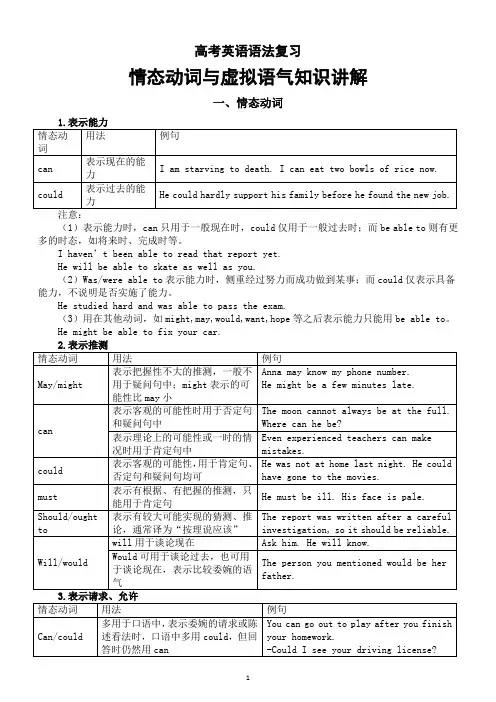
高考英语语法复习情态动词与虚拟语气知识讲解一、情态动词(1)表示能力时,can只用于一般现在时,could仅用于一般过去时;而be able to则有更多的时态,如将来时、完成时等。
I haven’t been able to read that report yet.He will be able to skate as well as you.(2)Was/were able to表示能力时,侧重经过努力而成功做到某事;而could仅表示具备能力,不说明是否实施了能力。
He studied hard and was able to pass the exam.(3)用在其他动词,如might,may,would,want,hope等之后表示能力只能用be able to。
He might be able to fix your car.(1)must还可以表示质问或感情色彩,意为“偏要,偏偏”。
Why must it snow on Saturday?(2)should还可以表示惊奇、愤怒、失望等特殊情感,尤其用在以why,who,how等开头的疑问句中或某些感叹句中。
why should you be so late today?(1)must作“必须”讲的一般疑问句,其肯定回答用must,否定回答用needn’t或don’t have to。
-Must I pay now?-Yes, you must./No, you needn’t.(2)need还可以作实义动词,有人称和数的变化,后跟带to的不定式作宾语。
She needed to go out for a walk.(1)两者在表示过去的习惯动作或行为时常可通用。
When we were children, we would/used to go skating every winter.(2)Used to与would都不能与表示具体频率、次数的词及特定的时间状语或具体的一段时间连用。
专题06 情态动词与虚拟语气情态动词概念:情态动词具有词汇意义,但意义不够完整,不能单独做谓语。
情态动词表示说话人的语气和看法。
一、情态动词概览had better/would(一)can, could(二)may, might(三)must, have to(四)shall(五)should, ought to(六)will, would(七)need, dare(八) had better, would rather(九)情态动词+have done1.对过去发生的事情或状态进行推想昨晚确定下雨了,因为路很泥泞。
The boy might have known the truth, but I am not quite sure.那个男孩或许知道了真相,但我不是很确定。
I didn't see her in the meeting room this morning. She couldn't have spoken at the meeting.我今日上午没在会议室望见她,她不行能在会议上讲话。
2.表示“与过去事实相反”You could have done better, but you didn't try your best.你本可以做得更好,但是你没有尽力而为。
I needn't have taken the umbrella, for the weather is fine.天气这么好,我本没必要带雨伞的。
You ought to have done this exercise more carefully.你本应当更细致地做这个练习。
You might have given him more help, though you were busy.你本可以给他更多帮助,虽然你当时很忙。
单句语法填空/单句改错1.(2024·北京高考)In today's information age, the loss of data ________ cause serious problems for a company.2.(2024·全国卷Ⅲ)Truly elegant chopsticks might ________ (make) of gold and silver with Chinese characters.3.(2024·四川高考改编)You ________ be careful with the camera.It costs!4.(2024·全国卷Ⅱ)As a kid, I loved to watch cartoons, but no matter how many times I asked to watch them, my parents would not to let me.________________5.(2024·全国卷Ⅱ)We can chose between staying at home and taking a trip.________________6.(2024·天津高考改编)I can't find my purse. I could ________ (leave) it in the supermarket yesterday, but I'm not sure.7.(2013·全国卷Ⅱ改编)Since nobody gave him any help, he ________ have done the research on his own.8.(2013·浙江高考改编)I ________ (enjoy) myself more — it was a perfect day.9.(2024·天津高考改编)I needn't worried before I came to the new school, for my classmates here are very friendly to me.________________1. 解析:can 句意:在如今的信息化时代,丢失数据可能会给一个公司造成严峻的问题。